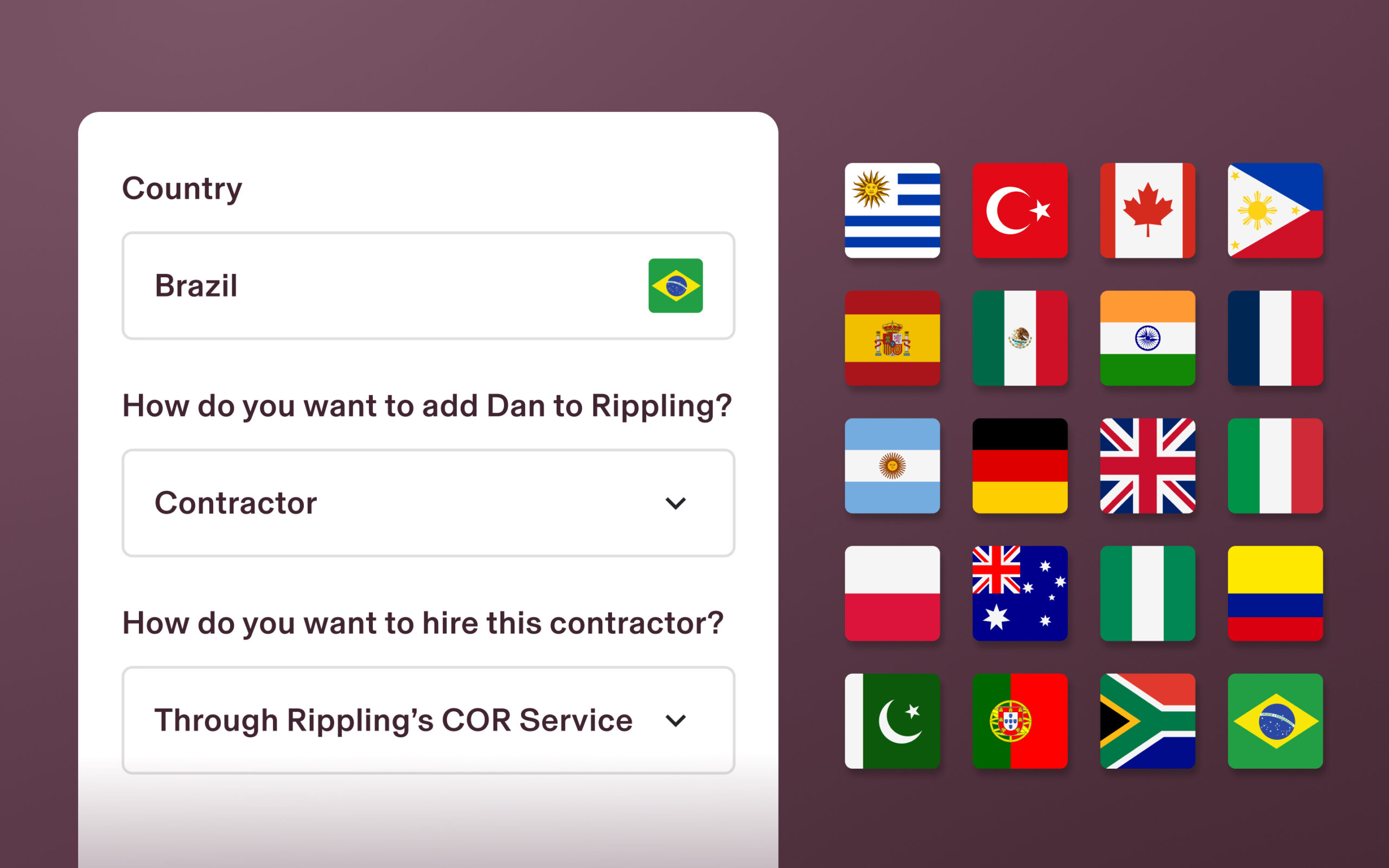Latest Stories
More to explore
Resources


The essential guide to working with remote contractors


How to Pay International Contractors in Philippines [2025]


10 Things You Need to Know About UK Employment and Labor Laws [2025]


What's new in Rippling — June '25 Release


ZTNA vs VPN: Which is the best solution?


What is dynamic access control (DAC)? Full 2025 guide


Auth0 vs Okta: Key differences and use cases [2025]


Income statement vs. profit and loss statement: Is there a difference?


Why a Single Source of Truth Is Essential for IT


Revenue vs. profit: What's the difference?


Authentication vs authorization: What’s the difference?


Cloud vs on-premise: Key differences and pros & cons


Employee profiles: Template & how to build one


Pave + Rippling: Make data-driven compensation decisions in real time


Recruiting and Hiring Platforms for Small Businesses (2025)


Best Business Password Managers for 2025: Complete Guide


Best Receipt Scanning Apps for 2025: Top Picks Compared


Top 8 Stripe alternatives for payments & billing in 2025


Understanding payroll costs: How to calculate, track & reduce them efficiently


Effective strategies for corporate tax planning


Best Two-Factor Authentication App for 2025: Top Picks


Best Two-Factor Authentication App for 2025: Top Picks


Types of corporations: How to choose the best fit for your business


Users have named Rippling G2’s #1 Payroll


Meet the Ripplers: Will Sorg


Meet the Ripplers: Kellie Clenton


What is a relocation package? Examples & best practices


How to calculate net income: formula and steps


Meet the Ripplers: Felix Le Dem


How to calculate employee retention rate: Steps & guide


Do business credit cards affect your personal credit score?


How to create a total compensation statement (with template)


Highest and lowest minimum wage in the world: Guide by country in 2025


What is NIST compliance? Requirements and tips


How to send an invoice in 8 easy steps


Giftbit Scaled Globally, saved money and sped up their operations with Rippling


Rippling Spend Corporate Card shines with a 5-Star review from NerdWallet


Exit interview: Free template and best practices


12 small business automation ideas & tools for efficiency


What are payroll liabilities? Everything employers need to know


How to process payroll for restaurants: Software, compliance, and best practices


Rippling Expands India Operations with Second Office


The complete guide to expense management automation


Best startup business credit cards with no credit check: Top picks


30-60-90 day plan template: Complete guide with examples


What's new in Rippling — May '25 Release


Cloud application security: Best practices & tools


Paid maternity leave by country: A global comparison for employers


Top 11 email security best practices for businesses [2025]


Corporate purchasing card (P-Card): What it is & how it works for businesses


Shaping the future together: Rippling’s 2025 Partner Advisory Board


Gusto vs. OnPay: Which payroll software is right for your business?


How the SWIFT system works: Complete guide on payments


Introducing Rippling+: Your new home for career-defining insight


Introducing Rippling+: Your new home for career-defining insight


Dive Into Rippling: The First 30 Days According to 9 New Ripplers


Meet the Ripplers: Kartik Sura


3 free interview templates and questions to find top talent


Top 7 benefits of globalization for modern businesses in 2025


Are unreimbursed employee expenses deductible? Finance guide


Top 4 easiest business credit cards to get in 2025


Payment automation: What it is, benefits & how to implement it in your business


Net profit vs. gross profit: What is the difference, and how do you calculate them?


The ultimate HR compliance checklist in 2025


Employee exit process checklist: A complete guide for HR (with template)


IBAN vs. SWIFT: Understanding the key differences


Costly HR compliance mistakes to avoid: Insights from our experts


Best startup business credit cards with no credit check: Top picks


Best 6 Insperity competitors & alternatives for 2025


4 financial statement templates: Free downloadable examples & how to use them


How we add commission payouts to payroll with a single click


Top 8 software license management tools for 2025


What's new in Rippling — April '25 Release


8 small business budget templates to streamline finance planning


15 key payroll software features & benefits


Rippling + Microsoft 365: Automate Your Workflow Effortlessly


Enterprise data security: Complete guide & best practices


Best 6 FreshBooks alternatives for 2025: Top software picks


MDM vs. EMM vs. UEM: Key differences for device management


How to start a marketing agency: Complete step-by-step guide


Meet the Ripplers: Sarah Cannistra


Top 6 Electric.AI competitors & alternatives in 2025


10 free employee schedule templates and how to create yours


Password policy: Best practices, guide & template


Top 21 countries with digital nomad visas + application guide


The transformative power of founder leadership


Credit card expense management software


Access control policies: What they are & best practices


SAP vs. Oracle: Ultimate ERP comparison for 2025


SAP vs. Salesforce: Which is the best choice for your business?


What are software implementations? 4 best practices


Employee evaluation form: Templates and how to write


Automate or die trying: How strategic CTOs reclaim 15+ hours weekly


Payroll audit: free checklist and best practices


What are voluntary benefits? Guide for employers


Best healthcare learning management systems: Software comparison for 2025


How to maximize R&D tax credits


Cash vs. accrual accounting: What are the main differences?


Network security policy: Complete guide & examples


A complete guide to beauty salon management in 2025


What is LMS integration? Top 10 best LMS integrations in 2025


The 10 best 360 feedback software tools for performance management in 2025


IT risk management: Complete 2025 guide


How to conduct a training needs analysis: Guide with examples


Founder spotlight: Vera Health’s co-founders on launching early and failing often


Empowering our workplace heroes: Why Rippling IT stands on its own


The Founder’s Guide to Total People Investment: 3 Strategic Moves That Drive Startup Growth


Users have named Rippling G2’s #1 Multi-Country Payroll Product


10 best accounts payable software for small & large businesses in 2025


FreshBooks vs. QuickBooks: 2025 finance & accounting management comparison


5 steps CTOs must take to automate onboarding IT tasks


ADP vs TriNet: Complete 2025 comparison for HR


What does equal opportunity employer (EEO) mean? Complete guide


How to write your corporate credit card policy: best practices and template


Top 8 NetSuite ERP competitors & alternatives to consider in 2025


8 best MDM for Apple devices: Top solutions in 2025


Back to basics: Why the CIS Critical Security Controls are your best defense in 2025


The 12 Rippling competitors & alternatives for HR management


NetSuite vs Salesforce: Which is the best CRM?


5 best HR tools every company needs to know in 2025


General and administrative (G&A) expenses: definition, tips, & examples


Bookkeeping for small businesses in 2025: A complete guide


The 10 best employee scheduling and shift planning software tools and apps


Top 8 cybersecurity framework list for 2025


A Solution for Global Workforces - Rippling Employer of Record Now Live in 80 Countries


Complete guide to federal income tax (FIT) taxable wages


How to perform a cybersecurity audit: Full guide for 2025


The CTO's playbook for scaling startup security and SOC 2


What is self-employment tax? Definition and how to calculate it


Brex vs. Mercury: Feature comparison for SMBs & startups


Top 8 vendor management systems (VMS) for 2025


The 7 best health insurance providers for small businesses in 2025


Top 9 best ERP software for construction and how to choose the best


How to track business expenses in 2025: A step-by-step guide


The 9 best contract management software for businesses of all sizes


100 effective peer review examples for performance reviews


Best 14 employee feedback tools and software to boost engagement in 2025


What's new in Rippling — March '25 Release


Unpaid time off: Definition, facts, and best practices


15 types of work schedules: how to choose the best and tips


10 best recruiting software for small businesses (2025)


Insperity vs. TriNet: Which PEO service is right for your business?


HR and payroll: Understanding the similarities and differences


What is a tip credit and what should employers know?


A complete guide to the full cycle accounts payable process


How I saved hours of work and create ready-to-share headcount reports in seconds


How we automatically pay out referral bonuses on time, every time


How I broke down remote work barriers with mystery meetups


What are payroll reports? Types, examples, and template


PTO payout laws by state: Which states require vacation payout upon termination?


Accounts payable outsourcing: What it is, pros & cons, and alternatives


IRS forms W-9 vs 1099: 5 key differences & uses


Rippling MDM for iOS and iPadOS


Kareem's Journey With Clay: Lessons in Creative Resistance and Growth


Safe Harbor 401(k) plan: Pros and cons for employers (2025)


Opportunity cost formula: calculation, examples, and best practices


Rippling + Zendesk: Streamline Your Customer Support Operations


Reporting Suspicious Deel Behavior


10 best Justworks alternatives and competitors for payroll and HR


Expenses receipts: complete guide on proof of purchase for businesses


10 Best PTO tracking software for 2025 (best leave management tools)


Managing and scoping React Native upgrades


Ramp vs. Expensify: Feature comparison for expense management in 2025


How to write an employee contract: examples and template


Building successful learning and development programs: Insights from our expert webinar


One-on-one meetings: Benefits, how to conduct it, and best practices


24+ employee self-evaluation examples for performance reviews in 2025


7 Jamf alternatives IT managers are choosing in 2025


How to pay an invoice: Steps, tips, and best practices


Top 10 applicant tracking system for small businesses


6 free and effective one-on-one meeting templates for managers in 2025


Employment verification letter: complete guide with free templates


The 9 best construction payroll software tools for 2025


Founder spotlight: Nowadays' Anna Sun on turning event planning headaches into AI innovation


Section 125 cafeteria plan: What it is and how to implement it in your business


Managing a multigenerational workforce: Benefits, challenges & strategies


5 best payroll software for nonprofit organizations in 2025


How do password managers work? Ultimate IT guide


What is a merit increase? A complete guide for HR managers


What’s the difference between exempt vs. nonexempt employees?


IT audit: Full guide for IT managers in 2025


OneLogin vs. Okta: Access management comparison 2025


Password cracker: 6 tools & strategies for protection


Mobile device management for small business: Top 7 solutions


How Rippling helped Reserv achieve 300% growth while keeping operations lean


8 best learning management systems (LMS) for nonprofits in 2025


How to measure employee satisfaction: 6 important metrics and methods


The 10 best time tracking software for small businesses


On-Target Earnings (OTE) salary: definition, tips & examples


Rippling + Abacum: Accelerating financial planning and expense analysis


10 employee feedback examples and how to use them


Gross vs. net pay: key differences and how to calculate them


Compensatory time off: definition, rules, and how it works


Mexico digital nomad visa: Everything you need to know


Best 11 payroll software for accountants in 2025


Top 8 onboarding software solutions for small businesses


7 effective roles and responsibilities templates and examples


How to create a PTO policy: Complete guide with template and examples


How to write a two-week notice letter: Templates & best practices


Founder spotlight: OpenFunnel’s Fenil Suchak on selling first, building later


What is a holiday bonus? A complete guide for employers


Wage garnishment rules explained: Guidelines for employers


Everything you need to know about leave management in 2025


Users have named Rippling the #1 HR Product on G2


Top 8 best scheduling apps for small businesses to boost productivity


Top 10 HRIS systems for mid-size companies


10 best HR software solutions for startups: Features, benefits, and comparisons


Okta vs. Duo: IAM features comparison for 2025


Short-term disability vs. FMLA: Key differences and tips for HR management


Paid maternity leave: Laws by state in 2025


Salary increase letter: Complete guide for employers + template


IAM vs. PAM: 4 key differences and how to choose


Top 11 IT management solutions in 2025


5 financial hacks for bootstrapped founders


Managing multi-state payroll processing: What employers need to know


Payroll ledger template: what it is and how to create one


NetSuite vs. SAP: ERP feature comparison in 2025


Top 7 Bill.com alternatives and competitors for expense management


The 12 best enterprise payroll software for large businesses in 2025


The 10 best Auth0 Alternatives with choosing tips (2025)


What's new in Rippling — February 2025


Introducing QuotaPath & Rippling: Simplifying commission payments for finance and HR leaders


Founder spotlight: How CTGT’s Cyril Gorlla is making AI trustworthy for enterprise


Deel vs. Remote: Complete global payroll comparison for 2025


Workers comp audit: How it works & how to prep


ADP vs. QuickBooks: Payroll features comparison in 2025


Minimum wage in 2025 by state: Complete guide


How to manage workplace conflict: 7 examples and resolution strategies


Workforce planning template: 4 examples and best practices


Small business financial planning: 5 key steps


How to calculate time and a half: A complete guide


What is a compensation philosophy? 6 examples and how to set it up


Hybrid workplace models: Benefits and best practices


Employee life cycle: The complete guide for HR leaders


How we pay contractors hassle-free


How we ace onboarding with new hire checklists


What is a data governance framework? Guide with template


The grievance procedure: Everything employers need to know


Disciplinary action at work: Complete HR guide with examples


The 11 most important steps of the hiring process


9 employee survey templates for your business


Job posting examples and templates to attract top talent


7 steps for creating an effective travel and expense (T&E) policy for your business


How we increased employee engagement with Rippling pulse surveys


How we transformed our hiring process with Rippling’s Recruiting App


Employee attendance policy: Comprehensive guide and templates


Gusto vs. Justworks: PEO and HR feature comparison


10 benefits of automation for modern businesses in 2025


Complete guide: What is identity governance and administration (IGA)?


Expensify vs. Concur: expense management features comparison in 2025


What is tail spend management? Complete finance guide


Dayforce vs. Workday: HR and payroll comparison in 2025


Streamlining job costing and compliance with Rippling


What’s the difference between EPO vs. HMO vs. PPO plans?


Employee relocation: What it is, how it works, and best practices


MDM vs. MAM: 4 differences and how to choose


MSP vs. MSSP: 3 key differences & how to choose


Cloud-based learning management system (LMS): What it is and 10 best solutions


Introducing Puzzle + Rippling: Simplifying payroll accounting for startup founders


Jamf vs. Kandji: MDM & features comparison in 2025


Rippling + Go1: Easily build successful employee training programs


How we save time, money, and headaches assigning equipment to employees


Top 8 TriNet competitors for HR and payroll in 2025


A complete guide to severance agreements with template & best practices


Mac or PC for work: Differences & how to choose


Federated identity vs. single sign-on (SSO): Key differences


Top 10 HR challenges in 2025 and how to solve them


How one rewards manager’s data obsession helped Flock Safety grow from 150 to 1,100 employees


Top 9 Expensify alternatives and competitors for expense management in 2025


Colombia digital nomad visa: Everything you need to know


ADP vs. Workday: A complete HR software comparison for 2025


Greece digital nomad visa: The complete guide for 2025


ADP vs. Paylocity: A complete comparison


Prorated PTO: what it is and how to calculate it


12 best invoice automation software for 2025


What's new in Rippling — January '25 Release


12 best HR compliance software solutions


Talent mapping: What it is, examples, and how to implement it for recruitment


How to choose a learning management system (LMS): 6 steps for businesses


Workday vs. SAP: Complete comparison for 2025


Gusto vs. Paylocity: HR software comparison for 2025


How to switch EOR providers


The top 6 global HRIS systems: The global HRIS software guide


10 Corporate learning management systems (LMS)


Employee satisfaction survey: questions, examples, and tips for evaluation


88 employee performance review phrases and comments for managers


Building a vibrant remote culture: lessons from Webflow’s $4B success story


Part-time vs. full-time: Differences and considerations for employers


Top 8 Workday alternatives and competitors for HR leaders


The 14 best LMS platforms for employee learning in 2025


How we stopped “brilliant jerks” from spoiling our culture


Top Paycor alternatives & competitors for HCM and payroll


Stipend vs. salary: Key differences for employers


Top 10 IT management tools & software for 2025


Paycom vs. Paylocity: Payroll & HR comparison (2025)


UKG vs. ADP: HR and payroll comparison in 2025


What is a travel expense report? Complete guide with templates


What is global human resource management (GHRM) and why it matters


Rippling Secures Electronic Money Institution (EMI) License from the Central Bank of Ireland


Building a founder first company


Justworks vs. TriNet: PEO and payroll comparison in 2025


What is labor burden and how do you calculate it?


Top 10 payroll companies to streamline payroll management


Password attacks: 8 types & how to prevent them


How to choose the right corporate card program for your business


Vacation policy: Complete guide for employers with templates and examples


Top 10 learning management system (LMS) features you need to know


How to create a cloud security policy: Guide & template


8 best learning management systems (LMS) for small businesses


20 key HR management software system features and requirements


The case for consolidating your finance tech stack


Scheduling is a manual, cumbersome task for up to 80% of businesses, this expert says. Rippling can help.


How we onboard and train new managers at warp speed


How attrition reports help us hire and keep stellar talent


How Rippling builds enterprise-grade APIs


Introducing Puzzle + Rippling: Simplifying payroll accounting for startup founders


Software security: What it is & best practices


Rippling is listed as a Representative Vendor in the 2024 Gartner® Market Guide for Cloud HCM Suites for Regional and/or Sub-1,000 Employee Enterprises


Paycom vs. ADP: Comparison of payroll and HR features


How to scale a business: 8 strategies for scaling a business from scratch


Recruiting funnel: Complete guide, stages and how to use it


What is exposure management? Guide & best practices


Cloud security assessment: Guide & checklist to get started


Why 99.5% of Rippling PEO customers stay with Rippling year over year


What's new in Rippling — 2024 Year in Review


90-day roadmap to succeed in your new senior finance role


Who pays for unemployment? What employers need to know


Full cycle recruiting: definition, steps, and best practices


Data security management: Elements & best practices


Pay structure: Types and tips for choosing the right one


Rippling’s all-in-one HCM: a viable solution to the portfolio approach


Piece-rate pay: what it is, pros, cons, and how to calculate it


OIDC vs. SAML: Key differences & how to choose


7 essential automations for lean IT teams


Paid sick leave laws: State-by-state guide


2025 payroll calendar templates for efficient management


How to manage payroll records: A complete guide


Workforce analytics: Types, examples, and tips


Pay compression: What it is & what to do about it


Gusto vs. ADP: Payroll comparison and best alternatives


Long-term incentive plans: A comprehensive guide for HR


How to write a professional promotion letter: Examples and best practices


What is threat detection and response (TDR)? Complete guide


Candidate sourcing: 8 strategies and best practices for recruiters


International employment law: the complete guide for employers


HR dashboard: 3 examples, functions, and KPIs


Gusto vs. Paychex: Payroll and HR comparison 2025


HR strategy: What it is, examples, and how to develop yours


21 hostile work environment examples, signs, and solutions


Introducing Boast & Rippling: Unlocking R&D tax credits for businesses


How we create a culture of appreciation


How we empower career progression and make role changes a breeze


How we eliminated IT logistics mishaps (and kept our IT team happy)


How to write an effective incident report: Step-by-step guide, example, and template


What is SaaS management? Top 7 platforms [2025]


Prepaid expenses: What they are and how to record them


Gusto vs. QuickBooks: 2025 payroll comparison


ADP vs. Paychex: How to choose the best for payroll


Is mandatory overtime legal? A guide for employers


Tactical advice for VC-backed founders: How to effectively allocate your new funding


What is data compliance? Complete guide & tips


8 advantages and disadvantages of forming a corporation for your business


Understanding the 8 steps in the accounting cycle


How to calculate liabilities: Step-by-step guide & tips


Minimum wage for tipped employees by state: Guide for employers


Compa ratio: Formula and how to calculate it


Differences between 1095 forms: 1095-A vs. 1095-B vs. 1095-C


7 best corporate credit cards for your business


Build a profit and loss statement: Examples with a step-by-Step guide


How to register a company in India


9 best vulnerability management tools & systems


How to calculate retained earnings: formula, examples, and importance


How to write a job description: Examples and best practices


Introducing Rippling & Lyft: Seamless corporate travel management


Rippling + Microsoft Entra ID integration: Simplifying hybrid user lifecycle management


Setting up a company in Ireland: What foreign employers need to know


Cloud compliance: Full guide & best practices


Compliance training: Types and programs for employees


Vulnerability assessment: Process and best practices


Travel expense reimbursement: guide for employers


How to conduct a cybersecurity risk assessment


MFA fatigue attacks: What they are & how to respond


HOTP, OTP, and TOTP: Differences & how to choose


Short-term disability: How it works and qualifications


How to write an employee write-up form: Template & guide


PTO accrual: Everything employers need to know


Is holiday pay mandatory? Complete guide by state


Salary vs. hourly: How to choose the best for your business


PTO vs. vacation: A guide for managers and owners


How we promote employee wellbeing and avoid burnout with automated time-off reminders in Rippling


Streamline onboarding with automated app provisioning and personalized communications in Rippling


California’s paid sick leave law in 2025: guide for compliance


Rippling IT 2024 roundup: Advanced security and full lifecycle management (and what’s next)


What's new in Rippling — November '24 Release


How to improve company culture: 10 proven tips


Better scheduling tools: A proven way to engage frontline workers, experts say


Rippling + Indeed: Seamlessly expand your talent pool


Top 10 SAP Concur competitors & alternatives [2025 guide]


How Travis Rauh pulled Pepsi of Worcester out of the 1980s


How to register a company in the UK


How to register a company in Singapore: Easy guide to setting up a local entity


11 types of employment contracts and how to choose the best for your new employees


Meet the Ripplers: Bridget Abraham


What is the difference between W9 vs W8 tax forms?


HR goals: 16 Examples and strategies to boost success


W9 vs W2: Crucial differences you need to know


Startup funding rounds: 7 Key stages for founders


Strategic sourcing: What it is, benefits, and best practices


Cross-training employees: what it is, tips, and benefits


Gusto vs. TriNet: Payroll & feature comparison 2025


LLC expenses cheat sheet: 14 deductible expenses and how to do write-offs


Rippling IT: The only unified platform to manage all IT needs securely


10 benefits of outsourcing HR and how to choose the best service


Top 20 most important HR metrics for data-driven teams


Fixed and variable expenses: Differences, examples, and how to budget


Startup costs and expenses deductions: tax treatment considerations


Payroll journal entry: Types, examples & best practices


Construction accounting: Step-by-step & best practices


Employee development plan: Template, examples, and guide


Top 12 remote work software & tools for teams in 2025


OASDI tax: What it is, how it works, and regulations


How does federated identity work? Benefits and tips


What is HR technology? 10 types & best practices


5 termination letter templates and how to write one


How to terminate an employee: 3 sample scripts


Payroll tax vs. income tax: differences, calculation, and best practices


Cost-benefit analysis: examples, benefits, and how to conduct one


Payroll direct deposit: how to set it up for your employees


Performance improvement plan: Template, examples, and writing tips


Considering a PEO in India? Here’s everything you need to know


Workplace wellness programs: 9 best ideas and benefits


3 leaders who are hacking global HR


Company registration in Canada: Easy guide to foreign entity setup in Canada


Considering a PEO in Canada? Here’s everything you need to know


Considering a PEO in the UK? Here’s everything you need to know


Considering a PEO in Singapore? Here’s everything you need to know


How to manage and track marketing expenses


Spend management: Benefits and best practices


Is mileage reimbursement taxable? A guide for employers


Meet the Ripplers: Clinton's journey at Rippling


Business startup checklist: Everything you need to get started


Telework vs. remote work: What is the difference?


Operating expenses (OpEx): Definition, calculation & tips


State reciprocity agreements: Complete guide


Scaling frugally: How we grew Reserv from 17 to 250 in one year


The essential guide to hiring international employees


Cybersecurity compliance 101: A complete guide


Mastering strategic workforce planning for 2025 and beyond


Consolidated financial statements: Guide & requirements


Mastering strategic workforce planning for 2024 and beyond


Unveiling HR trends shaping the future workplace in the UK


Unveiling the truth about Employer of Record (EOR) services


Letter of recommendation for your employee: Complete guide & templates


HR in the manufacturing industry: Role and 7 key challenges


What is a compensation plan? Types, benefits, and best practices


The overlooked secret powering 2025 HR goals: Employee training


Compliance 360: Building trust at scale


How to calculate payroll taxes: complete guide


The threat lurking in your BYOD policy with best practices


MFA vs. 2FA: Key differences and how to choose one


HR compliance: Laws and regulations employers need to know


Tackling the labour shortage threatening your 2025 business plans


Tackling the labour shortage threatening your 2024 business plans


Unlocking the power of talent attraction strategies


The silent engine driving team's success: competency management


The secret to keeping your best people: 4 talent retention strategies


Pay equity analysis: A complete guide for employers


10 best budgeting software for all-size businesses


At-will employment states: Everything employers need to know


What's new in Rippling — October '24 Release


10 best compliance management software and how to choose the right one


Top 10 best data protection software solutions


Employee benefits survey: Guide and questions to ask


Moving into new markets: 5 lessons we learned taking Rippling global


Human resources in the retail industry: Benefits, challenges, and best practices


Which employment laws apply to remote workers?


7 outsourcing examples for rapid growth and success


Predictive scheduling laws: A city & state guide for employers


Scheduling scaries: How to overcome scheduling nightmares with Rippling


20 small business tax deductions you can’t miss


Technology in financial services (fintech): 10 key emerging tools


How to do payroll yourself: Considerations for employers


Introducing Scheduling: Confidently meet customer demand with smart scheduling


Beware the Frankensystem: How the HR tech industry created a monster


[Infographic] 7 layers of cybersecurity: How to implement a layered approach


How to track employee hours for better productivity: Tools and tips


Strategic workforce planning: A step-by-step guide for businesses


What are salary bands & how to establish them? Complete HR guide


10 best workforce planning tools for your business needs


What percentage of revenue should go to payroll by industry?


How many pay periods in a year? A guide for employers


Finance automation: 2025 guide & best practices


17 effective employee incentive programs to boost morale


How to prepare an income statement in 7 steps with examples


Data protection strategy: Elements and best practices


Top 8 Deel competitors: Alternatives for HR software & global hiring


How to track employee time and attendance effectively: 3 best ways


C corp vs S corp: Differences, benefits, and how to set them up


Pre-tax vs post-tax deductions: What you need to know


12 types of accounting you need to know for your business


Prorated salary: Complete guide for employers


15 cloud security best practices for your business


How to make a work schedule for employees: 8 steps


How to successfully hire your first employee: a step-by-step guide


Final paycheck laws by state


Data breach response: 8 steps to create a plan


Complete IT onboarding checklist for new hires


12 best AI recruiting tools: A guide for HR managers


Year-end accounting checklist (2024)


Top 9 payroll mistakes, consequences, and how to fix them


IT security in 2025: Rippling's CISO and IT pro talk data, trends, and tips


What's new in Rippling — September '24 Release


Strength in layers: Why a layered approach to security is your best bet


How to process payroll: Step-by-step guide & tips for payroll processing


P&L management: Complete guide + 5 useful tips


DLP policy: A complete guide to protect your organization


10 proven employee retention strategies to reduce employee turnover


How to use AI for business automation: Use cases & examples


FSA vs HSA: Which health spending account is right for you?


Offboarding checklist: 6 steps & best practices


25 essential business expense categories and how to organize them


Payroll compliance: Laws, importance, and best practices


How to conduct effective employee pulse surveys: Best practices


How does unlimited PTO work? A guide for employers


10 best employee engagement survey vendors & providers


Meet Talent Signal: AI to help new hires succeed


9 best hardware inventory management tools


Business expense policy: Best practices & examples for success


Expense reimbursement policy: 5 best practices for employers


Top 7 Paychex competitors for HR outsourcing and payroll management


A guide to attribute-based access control (ABAC)


Payroll outsourcing: Benefits, drawbacks, and steps to do it


How to manage your business finances: 10 tips for small businesses


Bi-monthly vs. bi-weekly payroll: Understanding the differences


Part-time employee benefits: A guide for employers


The HR guide to employee recognition programs


Best 9 travel management software for expense management


How and where do remote workers pay taxes? A complete guide


Top 10 multi-factor authentication (MFA) providers and software


A complete guide to employee handbook for small business


Say goodbye to surprises with Rippling Spend


Introducing Rippling Visa Corporate Cards in Canada


18 types of employee benefits to offer to your employees


How to create a successful mobile device management (MDM) policy: A complete guide


BYOD security: A complete IT guide for employers


Rippling’s 6 Pillars of Policy: How to create a bulletproof expense policy


Introducing Rippling’s Global Contractor Hub


Strategic human resource management: A guide for success


Hiring international employees: A complete guide for employers


Visa sponsorship: How much does it cost to sponsor a work visa?


Top 5 B2B travel solutions for your company


New employee orientation: What it is, checklist, and best practices


How to calculate FICA tax: A guide for employers


The 8 best human capital management software


10 best endpoint security solutions for your business


35 employee engagement survey questions for your HR surveys


California pay transparency law: What employers should know


AI tools for HR automation: How to use them, best options, and benefits


Workers’ comp for remote employees: Complete guide for employers and employees' safety


AI recruiting in 2025: boosting efficiency in talent search


Artificial intelligence in Human Resources: Benefits, examples and trends


Corporate travel program: Complete guide for creation and implementation


How many hours is part-time? Part-time job hours per day


Best AI tools for small businesses to automate workflows


Artificial intelligence in finance: 10 examples and benefits


ChatGPT for HR: Complete guide for HR


Corporate credit card vs. business credit card: Key differences


10 recruitment automation software for your company


The 6 Best OneLogin alternatives & competitors


What is remote monitoring and management (RMM)?


Checklist: How to implement zero trust in 6 steps


The 8 best ADP alternatives for HR and payroll software


LDAP vs. Active Directory: Key differences and benefits


The 10 best employee training software tools


Small business expense tracking: 8 best tools


Why is it important to implement salary benchmarking?


Unified endpoint management (UEM): Definition and benefits


Top 10 Okta competitors and alternatives


6 best travel and expense management software systems


How to manage a remote team: 15 best practices


Employee expense reimbursement: A guide for employers


Payroll services cost: A guide to choosing cost-effective solutions


How to hire employees for your small business: Complete guide and best hiring practices


What is shadow IT? Risks, benefits, and examples


The best employee onboarding software for small, mid-size, and large businesses


What is device trust and how does it work?


How to write a corporate travel policy? Best practices and benefits


What's new in Rippling — August '24 Release


Compensation Survey: What it is, why it matters, and how to conduct one


Expense management and report automation: The complete guide


Intrusion detection system (IDS) vs. intrusion prevention system (IPS): Differences and similarities


Suspend-unaware cross-platform monotonic time in Rust


The best 7 PEO HR solutions


The best 7 BambooHR alternatives and competitors


What are payroll deductions and how do they work? Complete guide


The 7 best employee benefits administration software


The best human resource analytics software


The best 6 Paylocity competitors


Role-based access control (RBAC): What it is, benefits, and examples


How much does a PEO cost? PEO pricing guide


The 8 best Paycom competitors


Top 10 financial management tools and software for your business


Top 8 spend management software for your business


The top 5 reasons global employers get sued, and how to avoid them—from 3 lawyers


Meet the Ripplers: Emmy Quinn turned Rippling users into lifelong advocates


Engineering a SIEM part 3: Creating cost-effective, scalable detections


The 8 best IT inventory management systems


PEO vs. Rippling HR Services: Differences & Which Suits Your Business Best


The 10 best single sign-on (SSO) solutions for your business


Is it time to ditch your legacy corporate card provider?


New Recruiting features automatically coordinate interview schedules—and spare calendar-hunting headaches


1099 vs. W2 Employees and Forms: Differences for Employers


The Best HR Software for a Small Business


The best compensation management software


A guide to workers' compensation insurance cost


Payroll management system: What is it, types, & features


California work-from-home reimbursement law: A guide for employers


Contingent workers: Your flexible workforce solution


Introducing IT Management: Complete visibility and control over all things IT


How startups can set up health insurance benefits


Ramp Vs. Brex: Which Card Is Better For Your Company?


What is an expense report? Free template & complete guide


Unlocking efficiency: The best expense management software


The 9 best employee performance management software for HR


Employee Performance Review: How To Conduct It & Examples


10 best contractor management software and solutions


How to improve employee engagement: 10 Tips


11 Best HRIS Software & Systems for HR Teams


10 best employee management software for your company


The 8 best time and attendance software platforms


How to hire an app developer in India


How to hire a software developer in India


What are pre-tax deductions and contributions?


Top 6 Gusto alternatives and competitors for HR teams


Payroll automation: what it is, benefits, and how to leverage it


Introducing custom courses in Rippling


Certified Payroll: Everything You Need to Know


A guide for offering small business employee benefits


Top 10 identity and access management (IAM) software tools


How to Pay Independent Contractors (1099)? A Complete Guide


How to hire a developer in India


How to hire a WordPress developer in India


IRS Form 941: How to Fill Quarterly Tax Returns


The Rippling effect, explained


How to do background checks? A complete guide


What Is HR automation? 9 examples and benefits to start out


7 powerful (yet simple) steps to secure your Rippling tenant


The essential guide to switching payroll systems [2025]


What to look for in the best payroll software for small business


How to pay payroll taxes


Top 10 mobile device management (MDM) solutions for every business


Bill pay solutions for businesses: Save time, manage costs, and get ahead


Cost control strategies for lowering expenses and boosting profits


Identity management software: Securing user access in the modern enterprise


PreSeeding: A faster way to run tests


IT services and solutions: How small teams can streamline workflows and boost productivity


How to protect your small business: Cybersecurity best practices


Top 8 Ramp competitors for spend management software in 2025


Expense management software: Top 7 Brex competitors in 2025


How to find the best performance management tools


The CFO software stack: Must-have tools for finance leaders


Rippling’s design career ladder: How we help product designers level up


Headcount planning: a complete guide for HR


The designer dilemma: How to continuously improve your craft at a fast-paced startup


IT beginner's guide: Endpoint security and EDR


Endpoint protection: The impact of AI and ML on threat detection


How to (legally) hire international contractors—from 2 employment attorneys


You asked, we answered: Top 10 questions for our IT experts


Expense management: How to automate the reimbursement process


Grille salaire syntec 2024 : guide des montants et calculs


9 best applicant tracking systems for 2025


SOC 2 compliance: A step-by-step guide to prepare for your audit


Transforming onboarding at Sibros with Rippling


SOC 2 Type 2: What sets it apart from other SOC frameworks


How to use a SMART goals template for effective goal setting


Performance Management by Rippling


IT beginner's guide: System and Organization Controls 2 (SOC 2)


Rippling using Rippling: 4 ways we successfully recruit top global talent


How to build a general ledger and balance your books with ease


Introducing configurable profiles: Customize Rippling to meet your business needs


Understanding the performance management cycle: A guide for employers


Top 7 security benefits of mobile device management (MDM) software


Performance management: Stages, benefits, and best practices


How Rippling runs IT: Ensuring smooth offboarding


Automate the boring parts of IT with Rippling


Top 10 HR challenges in 2025 and how to solve them


Rippling’s platform + Carta’s database = the new frontier for managing compensation bands


Meet Rippling: The easiest way to manage your workforce in Canada


Automated leave tracking: Managing your workforce when employees need to unplug


File your 2023 HCSO report in under 5 minutes


Quality Week: 5 days for engineers to solve the things that annoy them most


Introducing Rippling + Wealthsimple: Workplace savings for Canadian teams


How Rippling is redefining multiregion data residency


Compliance beyond the certifications: How we keep customer data secure


Costa Rica digital nomad visa


How Rippling runs IT: Managing Google licenses and user groups


Mastering mobile app quality: Rippling's CI/CD journey with Bitrise


Rippling launches in India


Rippling and J.P. Morgan: Unwavering commitment to clients


Inventory Management touches down in Europe


Rippling CFO Adam Swiecicki discusses leadership and sustaining growth on the Run the Numbers podcast


Portugal digital nomad visa (D8) for remote work: Complete guide


Complete guide to Canada digital nomad visa for remote work


Spain digital nomad visa


Code ownership at Rippling


How long does a work visa last?


Compliant hiring strategies for global workforce expansion


How to become a digital nomad


Introducing Rippling Bill Pay


How to work from India for a US company


How Rippling runs IT: Strengthening MFA with Yubikeys


Meet the Wavemakers: 17 HR leaders you need to know


How Rippling runs IT: Ensuring new hires have the perfect first day


Rippling appoints Eisar Lipkovitz as Chief Product Officer


5 reasons to love your HCM


Rippling + SHRM webinar recap: Talent effectiveness across the employee lifecycle


Why Rippling stands apart: The power of consolidation in financial management


How Rippling runs IT: Managing Slack channels and user groups


How Rippling runs IT: Preventing device performance issues


How Rippling runs IT: Replacing employee devices


How to manage employees’ equity in Australia


3 ways HR leaders are using Rippling to drive business outcomes


The 9 best Employer of Record (EOR) Services [2025]


7 benefits of using modern payroll software


Streamlining AWS access with Rippling at scale — Integrating IAM Identity Center and Just-In-Time access


Introducing Candidate Feedback Summaries: Bringing AI into Rippling Recruiting


How to pay international contractors in UAE [2025]


Scaling stories at Rippling: Fast Serializers, Part 1


Introducing Rippling + HackerRank: collaborative code pairing and technical assessments


How to manage employees’ equity in India


How to compliantly pay contractors around the world


What you need to know before hiring internationally: A guide to terminations


6 best practices for managing remote employees overseas


PEO vs. EOR: Which is the right fit for your business needs?


Pay transparency laws are changing—here’s how to keep up


Worker misclassification: How to know if you’re at risk—and what to do about it


Consequences and penalties for misclassifying 1099 contractors and employees


10 effective ways to boost employee morale


How to choose an Employer of Record for your global workforce


The best countries to hire remote designers


New hire checklist: A step-by-step guide to onboarding employees in in Thailand [2025]


New hire checklist: A step-by-step guide to onboarding employees in Australia [2025]


Thai labor and employment laws: All you need to know [2025]


Everything employers need to know about Philippine employment and labor laws [2025]


The complete guide to termination of employment in Thailand


The easy guide to employee background checks in the Philippines


The easy guide to employee background checks in Canada


The easy guide to employee background checks in India


How to hire employees in the Netherlands through an employer of record (EOR) [2025]


How to hire employees in Poland through an employer of record (EOR) [2025]


How to hire employees in the Czech Republic through an employer of record (EOR) [2025]


How to hire employees in Germany through an employer of record (EOR) [2025]


How to work remotely from another country


How to classify independent contractors and workers in the Philippines (Quiz included) (2025)


International and global payroll: Everything you need to know


How to ask for payment politely and professionally (with email templates)


How to run international payroll for employees in Ukraine [2025]


Payroll in Australia: Complete guide on how to pay employees [2025]


How to run payroll in the Philippines: A guide for global employers [2025]


A complete guide to payroll in the UK: Everything employers need to know


How to run international payroll for employees in Thailand [2025]


Forms 1099 MISC vs. 1099 NEC: What’s the difference?


The complete guide to offering employee benefits in the UK


Employee benefits in Canada: A complete guide for employers


The complete guide to offering employee benefits in India


The complete guide to offering employee benefits in Australia


How to write a job offer letter in the UK (with templates)


5 ways to automate employee onboarding


10 HR technology trends to look out for in [2025]


Onboarding checklist: 12 key steps & template


“OMG, did you see this week’s paystub?”


Abolish your “irreducible crap work”: Parker Conrad on the Kruze Consulting podcast











